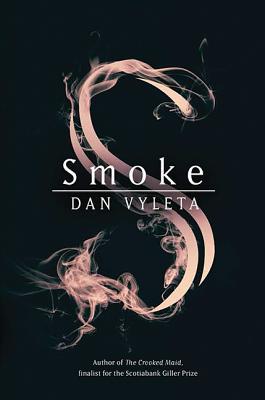How do you start a revolution?Over the past few years, and based on just two of his books – The Crooked Maid and The Quiet Twin – I have become quite a fan of author Dan Vyleta: his plots have been fascinating and his writing masterful. When I saw that he had a new book, Smoke, coming out, I was delighted; there are so few givens in my reading life, but I knew I would love Vyleta's new book...and I didn't love Vyleta's new book. The setup was really intriguing, and then it got boring, and then it got confusing, and then it ended. Boo.
You baptise a corpse.
The setup: the book opens at a Victorian-era British boys boarding school (the usual semi-abusive system with all-seeing professors, prefects, and headboys), and in a secret midnight trial, an upperclassman who refers to himself as Cesar attempts to force a boy to exhibit his Smoke:
The laws of Smoke are complex. Not every lie will trigger it. A fleeting thought of evil may pass unseen; a fib, an excuse, a piece of flattery. Sometimes you can lie quite outrageously and find yourself spared. Everyone knows the feeling, knows it from childhood: of being questioned by your mother, or your governess, by the house tutor; of articulating a lie, pushing it carefully past the threshold of your lips, your palms sweaty, your guts coiled into knots, your chin raised in false confidence; and then, the sweet balm of relief when the Smoke does not come. At other times, the Smoke is conjured by transgressions so trifling you are hardly aware of them at all: you reach for the biscuits before they have been offered; you smirk as a footman slips on the freshly polished stairs. Next thing you know its smell is in your nose. There is no more hateful smell in the world than the smell of Smoke.As the mysteries of Smoke are revealed to the reader – Is it a sickness or a symptom? A sin or sign of humanity? – it also becomes clear that it is a marker of class: only those from important families are trained to control their Smoke, while the unwashed masses in the mines, factories, and those living downtown London freely spew black clouds into the air, displaying their naked passions, egging one another on:
Who can watch the Smoke and deny it; see one person clean and the other mired in their messy desires; one regal and enjoying God's good favour, rewarded for his goodness by his power and his wealth, and the other toiling and miserable, underfed, poor, his very skin scorched by diseases of bad hygiene – who can see all this and not feel the superiority of the one and the inferiority of the other? It is as though two races walk our land, one blessed, the other cursed.In the beginning, this works as an alternate history (like Jonathan Strange & Mr Norrell), and as it proceeds, as an examination of the hypocrisy of British class divisions (like Howards End), but ultimately, it doesn't really succeed at developing either of these ideas. (Actually, it's very interesting to have read on the heels of A Clockwork Orange because if part of this book's intention was to examine the futility/immorality of suppressing man's basest instincts, it didn't much succeed at that either.) The action stalls when the plot leaves the boarding school, and as a subplot involving those who would seek to undermine the system of Smoke comes to the forefront, it felt like this became a different book and I am still not clear about what was supposed to have happened in the end.
I liked the few instances of Victorian medical contraptions and the introduction of Dickensian characters. And while at first I thought I was going to like when Julius/Cesar embraced the Smoke (he is “not mad. He is that thing from which madness is knit.”), in the end, I never understood this character at all:
I'm having trouble with words, with time. I'm different now, transformed. A buzzard climbing the updrafts of Smoke. My bones hollow, my body a husk: reinhabited. I, the dark twin of my former self, flesh of my own liver. I am my own father and mother; Renfrew my midwife; the mask my baptism and last rites. Children cower when I pass them in the streets.So, I'm left disappointed and confused, but will still happily pick up Vyleta's next book. This is a very low three stars; a rounding up to “like”, which I didn't quite.

